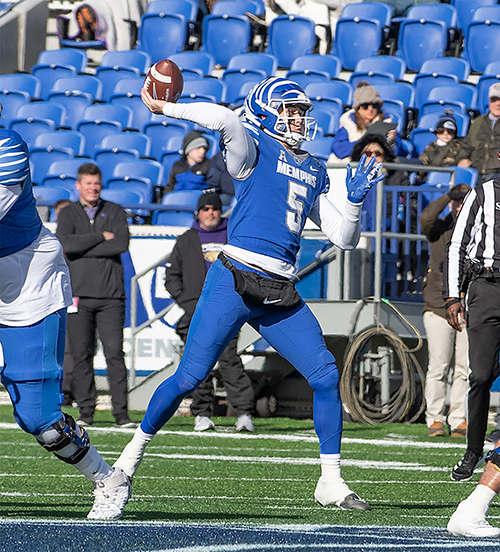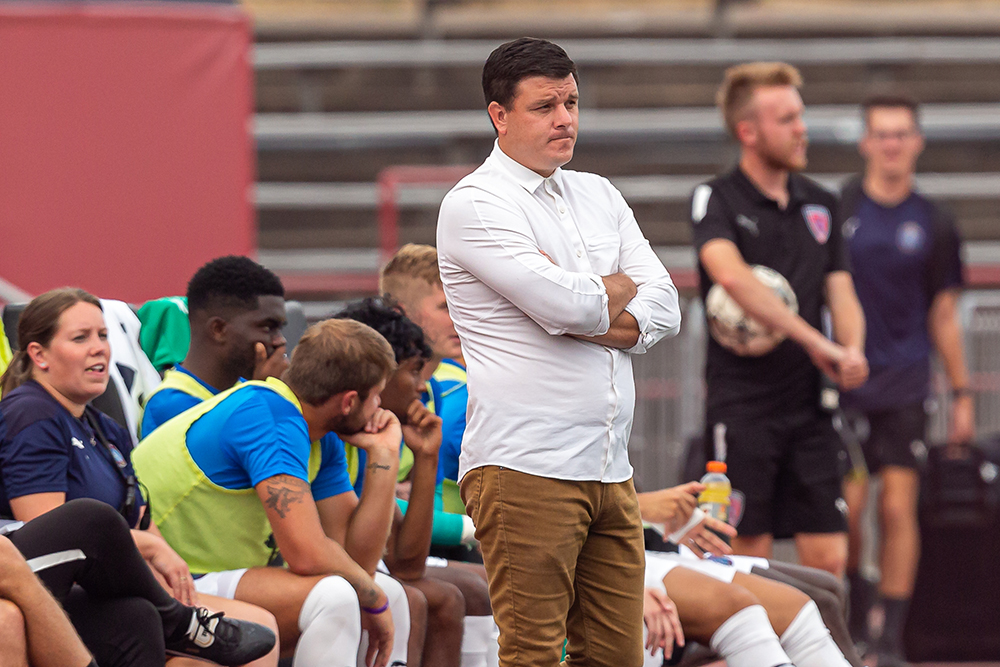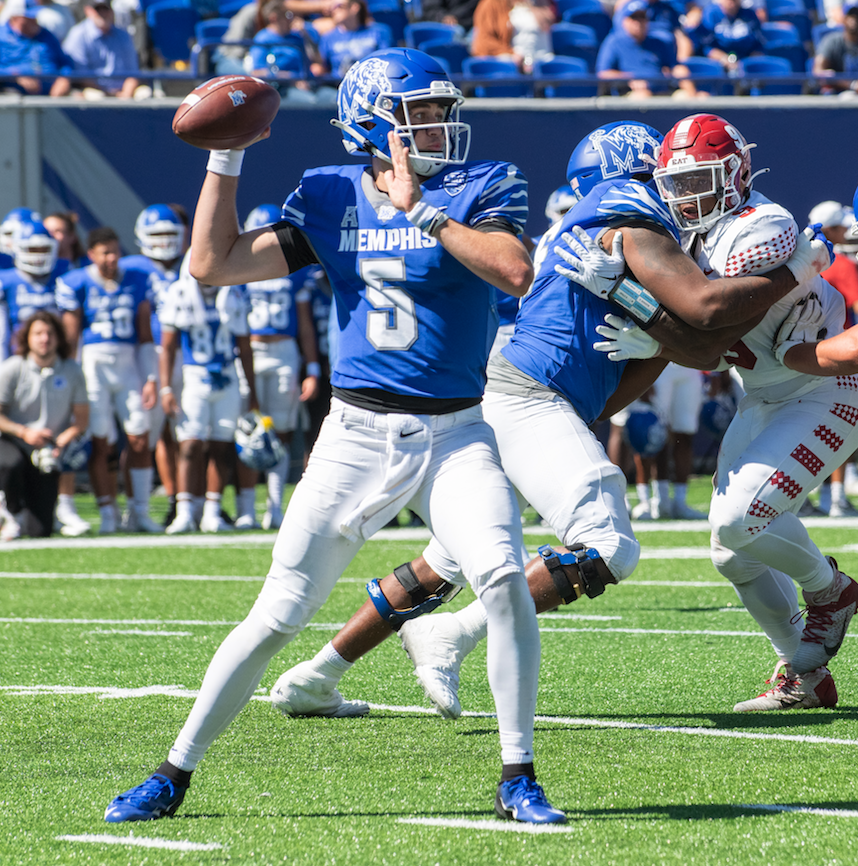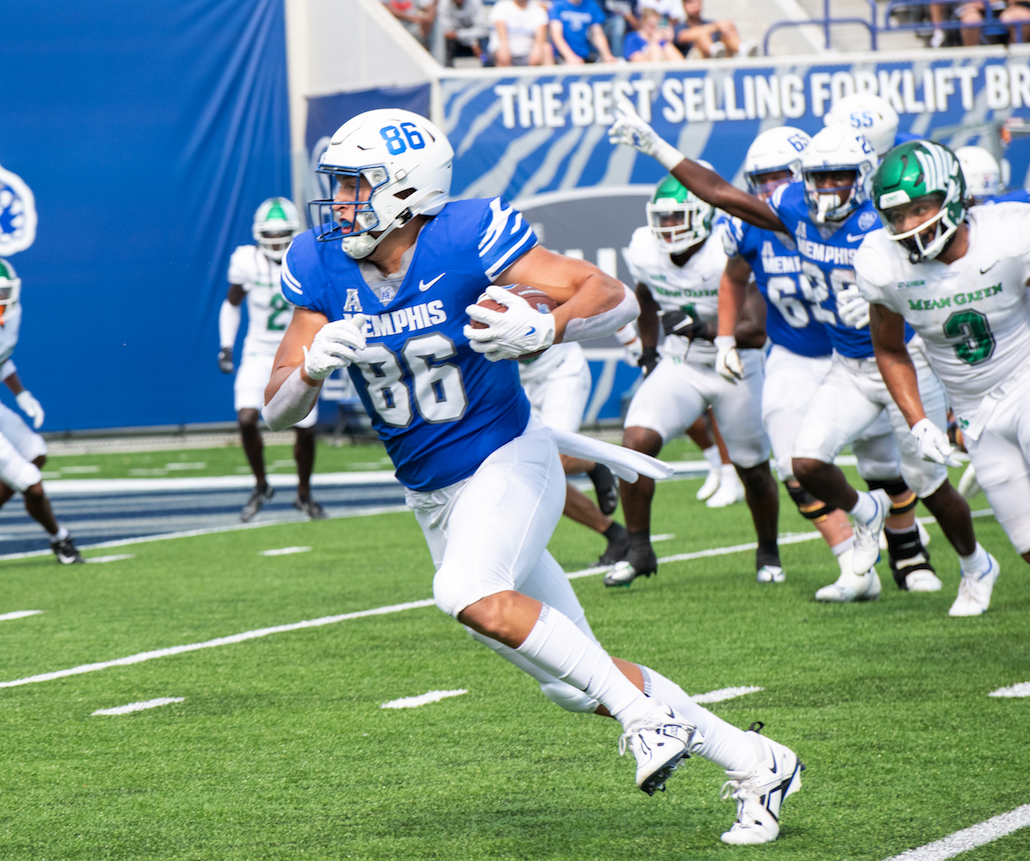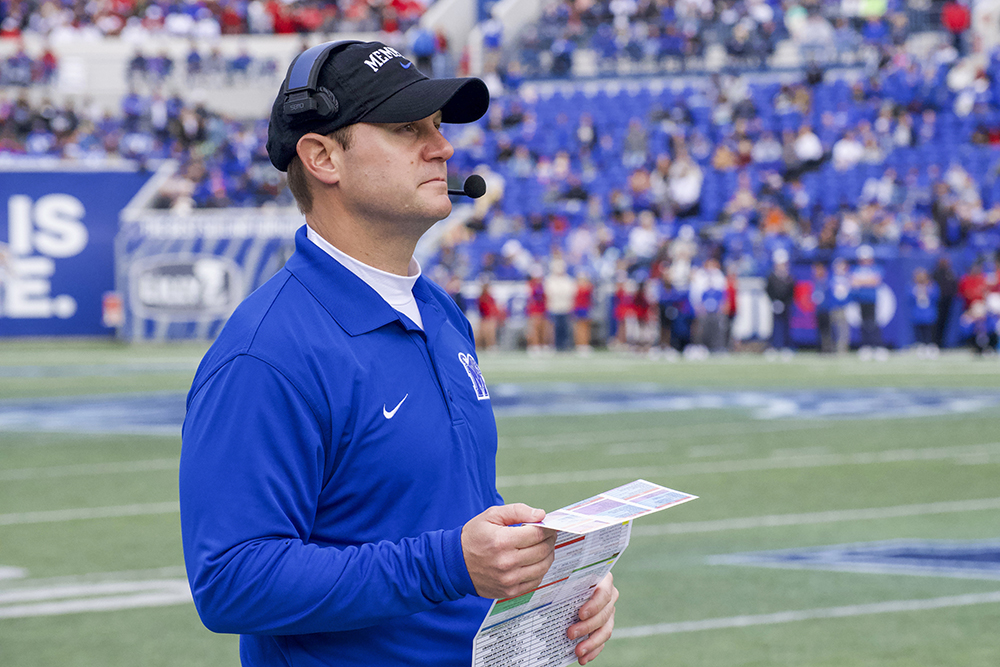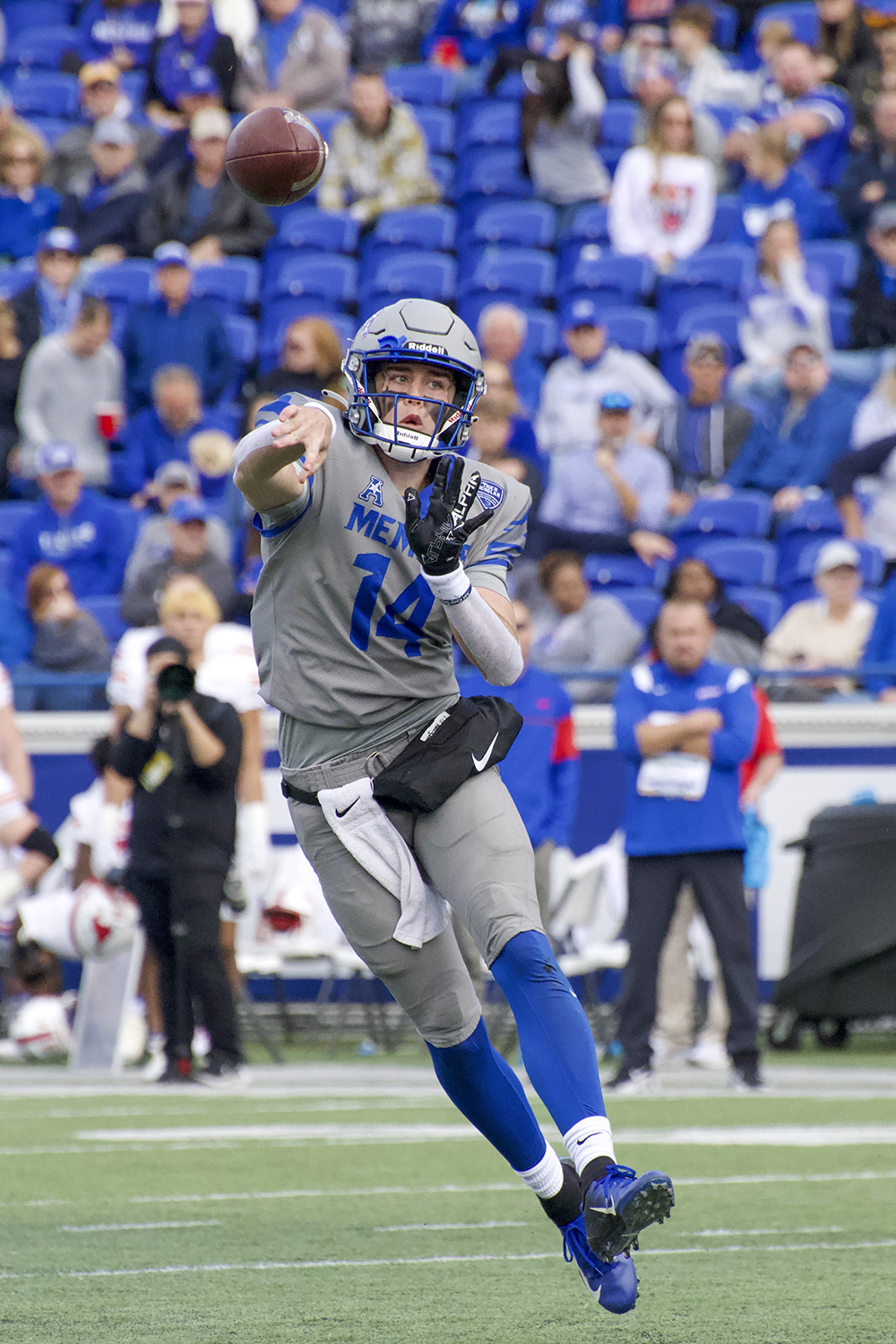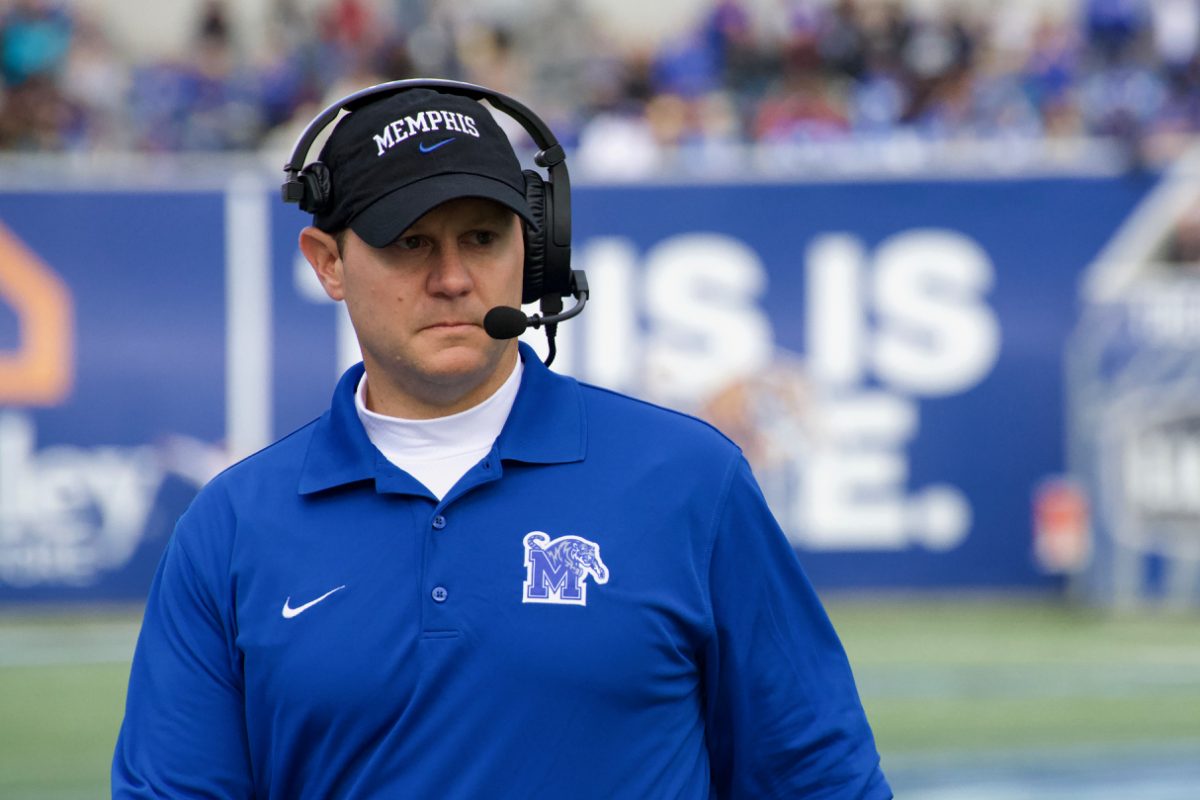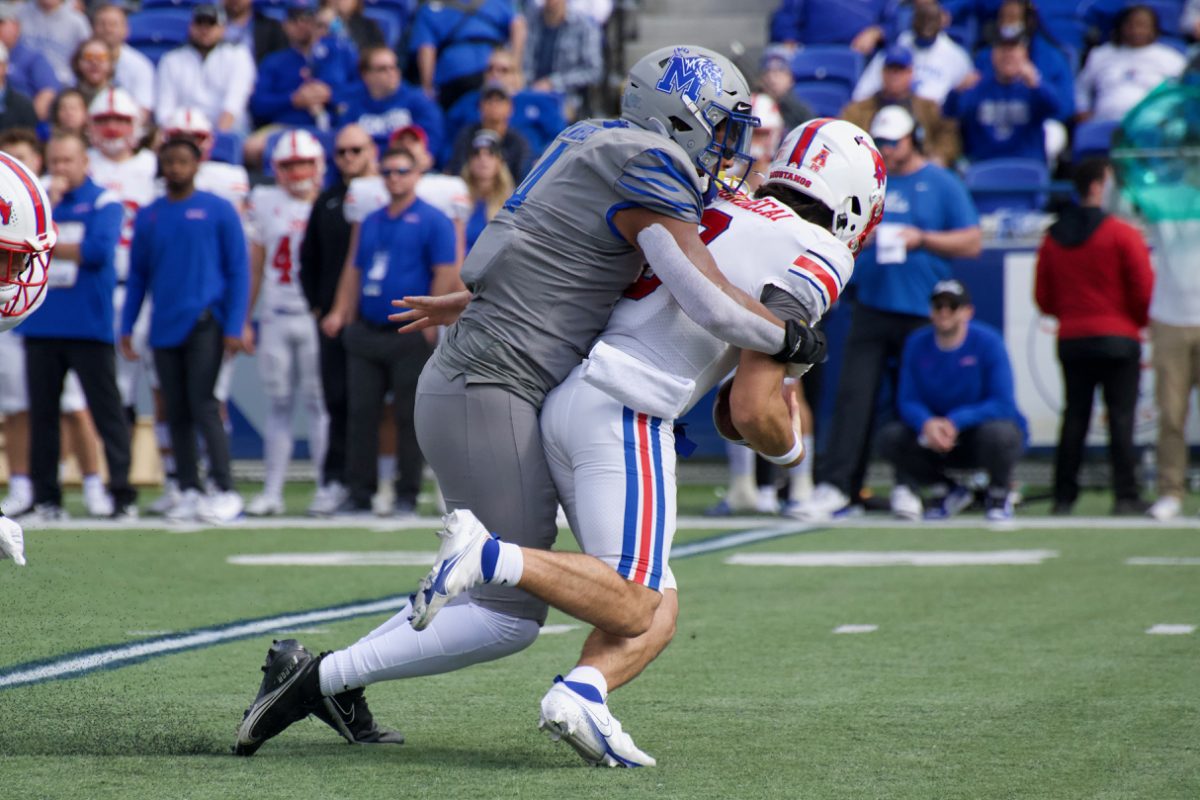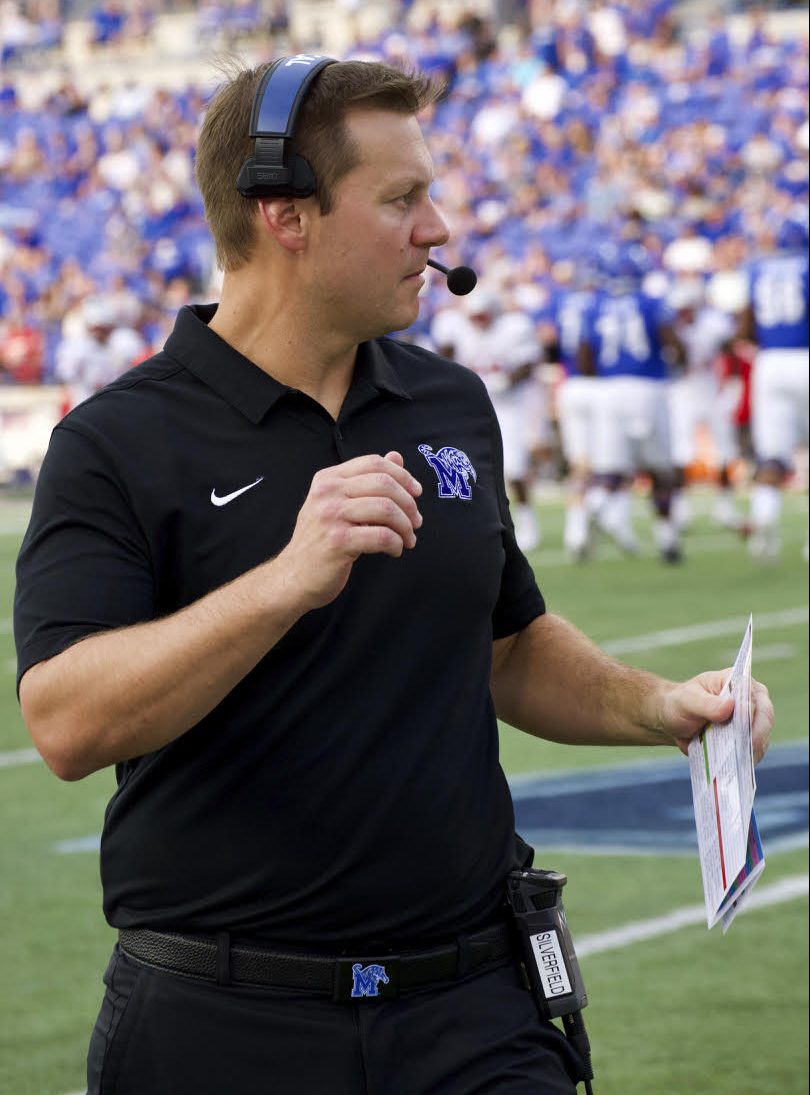The Memphis Tigers have a rare breed in junior quarterback Seth Henigan. With the transfer portal shuffling college football rosters like an overstuffed deck of cards, an athlete playing the sport’s premium position at the same school for three years is becoming rare. In fact, only 15 FBS quarterbacks (among 133 programs) will appear in the same uniform for a third season this fall having started more games than Henigan’s 24. A recent review of said transfer portal revealed no fewer than 74 quarterbacks (starters and backups, mind you) having departed one program for another since the 2022 season concluded.
Yet Henigan remains in blue and gray, the colors he’s worn since, literally, the day after his high school team (Denton Ryan High School in North Texas) won the 2020 state championship. Having started his first college game as a true freshman in 2021, Henigan will graduate after the fall semester with a degree in business management. By that time, he’ll have three full college seasons under his belt, and still shy of his 21st birthday. What kind of season should Tiger fans expect? It would be tough to top the expectations of Henigan himself, a signal-caller in shoulder pads for as far back as his memory will take him.
Henigan grew up with two brothers (one older, one younger), so competition was woven into the family fabric. Basketball. Football. And the kind of “house sports” only the parents of sibling rivals can fully appreciate. “We’d play ping-pong, darts,” recalls Henigan. “I was always trying to be like my older brother Ian and beat him in everything. I played T-ball but didn’t move on to baseball. Played lacrosse for one year. I’ve always had good hand-eye coordination, but no sport was as fun to me as football.” Ironically, Henigan found himself injury prone in basketball, breaking his nose and his left hand on the hardwood. So hoops became past tense after his sophomore year of high school. “I needed to focus on football,” he says, “and get my body prepared for college.”
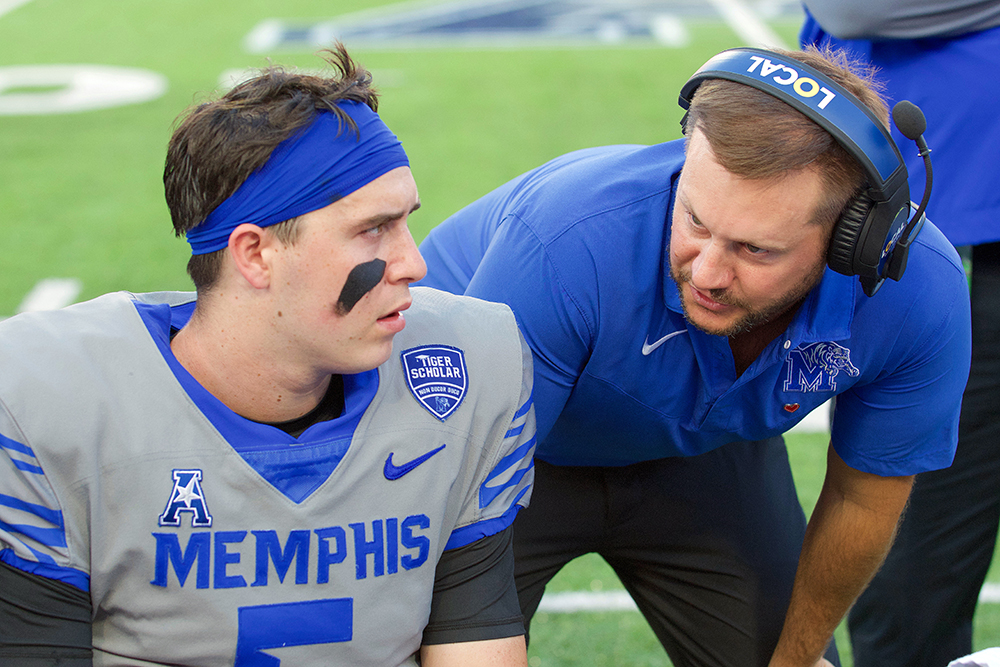
Going all the way back to his earliest flag-football memories, Henigan can’t recall playing any position other than quarterback. It helps being the son of a highly successful coach. (Dave Henigan has coached Denton Ryan since 2014 and earned at least one Coach of the Year honor every year from 2016 through the championship season of 2020.) He would accompany his dad on game nights and spend the pregame tossing a football with anyone willing to toss it back. “It was a bonding time,” notes Henigan, “and with my brothers, too. I liked having the ball in my hands. I was pretty fast, and I could throw the ball better than the average kid. Being able to make plays, from a young age, that was the position I was going to play to be the most successful in this sport.”
If quarterback isn’t the hardest position in team sports, it’s in a short conversation. (We’ll allow the case for baseball’s catcher.) Physical tools — height, arm strength, foot quickness — take an athlete a long way, but playing quarterback well enough to win championships requires as much talent between the ears as elsewhere. And the ability to absorb contact is a requirement.
“As you move up levels, the position becomes way more taxing,” says Henigan, “both physically and mentally. I wasn’t hit that much in high school, but at the college level, it’s a different feeling. We don’t get hit in practice because [coaches] are trying to preserve quarterbacks. When you get hit for the first time, it changes the entire game. Having that experience early in my college career really toughened me up. You’re playing 300-pound defensive linemen, and their goal is to harass you.”
As for the mental component, it’s the invisible tools that made Tom Brady the Tom Brady, that allow Patrick Mahomes to see angles and gaps most quarterbacks cannot. “You know so much about coverages,” explains Henigan. “You know the names, you draw them up, you speak them. Some quarterbacks learn better verbally, and some need to see it on a board. Or going through it on a practice field.”
Henigan draws a parallel between a quarterback’s mental challenges and those of a decidedly less physical sport. “Golfers’ mental game is so important,” he notes. “It’s hard to compare to any other position on a football field. You’re in control of so many aspects. You know everyone’s assignment on offense. A middle linebacker may know this for the defense, but he doesn’t have control of the play’s outcome. A quarterback has the ball in his hands. There’s so much going on. You’re thinking of 21 other guys on a field, reacting to a defense. The defensive coordinator’s job is to confuse the quarterback. You have to react as the play is going on.”
In the time it takes you to read this sentence, a quarterback must decide between handing the ball to a running back, running the ball himself, or passing to as many as five potential receivers. “Decision-making, accuracy, and toughness are three of the most important components for a quarterback,” emphasizes Henigan. “Fluid intelligence is key. That’s how you make your money, so to speak. Offenses and defenses both have tendencies. After a while, you identify consistencies in the way defenses want to attack our offense. But it changes each year. The base knowledge helps though. You have an out-of-body experience. It feels like you’re watching yourself because you’ve done it so many times. It’s muscle memory, and natural. I’ve seen a lot.”
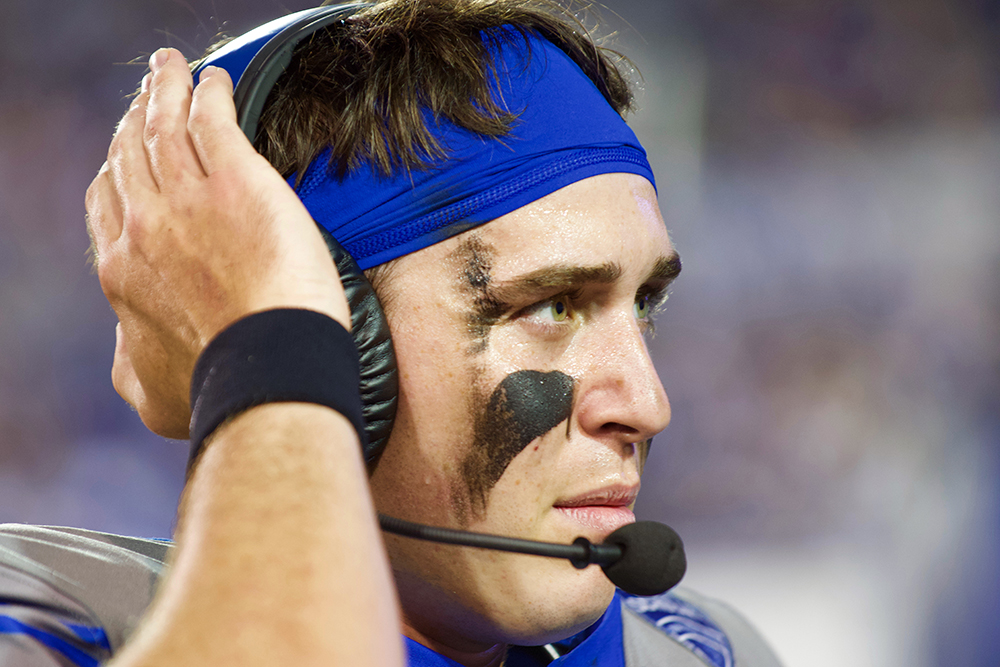
Henigan grew up a college football fan, more so than any devotion he might have developed for an NFL team. With his family wrapped up in “Friday night lights” followed by college games on Saturday, Henigan’s mom would actually not allow football on television come Sunday. Henigan’s favorite quarterbacks were a pair of Heisman Trophy winners in the SEC: Auburn’s Cam Newton and Texas A&M’s Johnny Manziel. He loved their exploits but notes he’s never modeled his playing style after another signal-caller.
Despite compiling an eye-popping record of 44-2 over three years as a starter at Denton Ryan, Henigan was not heavily recruited by FBS programs. Former Memphis offensive coordinator Kevin Johns, though, made the kind of impression both Henigan and his family sought in choosing Seth’s college destination. “I had a good year as a junior,” notes Henigan, “but my body wasn’t spectacular. I was always smart and worked hard, and those attributes can take you a long way. Coaches weren’t really talking to me consistently, until coach Johns came after my junior year. He listed attributes of a good quarterback that I displayed and why I was attractive [to Memphis]. He’d show me film on FaceTime, break down plays. He’s the only [college] coach who did that with me. It was exciting, seeing how I’d fit the program here.”
Having enrolled for the spring semester in 2021, Henigan was comfortable with Memphis — both the city and campus — by the time fall camp opened. When the quarterback expected to start the ’21 season opener (Grant Gunnell) tore his Achilles heel late that summer, Henigan seized the opportunity. “Even if I was going to be the backup, I didn’t want to be a weak link,” reflects Henigan. “So I was mentally prepared. I have a whiteboard in my room at home. I’ve had it since my junior year of high school. Every week, I’ll change the name of the opponent, list base defenses, third-down defenses, and how we were going to attack them. I picked things up pretty quickly. That’s all I did that first spring camp: study that whiteboard and learn [as a college quarterback]. Coach Johns and I would throw on weekends at his house. He cared for me as a true freshman.” (Johns has since moved on and is now the offensive coordinator at Duke University.)
The Tigers went 6-6 in 2021 (Henigan’s freshman year) and qualified for the Hawaii Bowl, a game that was canceled the day before kickoff because of a Covid outbreak in the Hawaii program. Memphis went 7-6 last season and beat Utah State in the First Responder Bowl. Two decades ago, such marks would have qualified as successful seasons in these parts. But the program’s standards are higher. So are Seth Henigan’s.
“There’s no such thing as a young quarterback,” says Henigan in evaluating the midpoint of his college career. “You either have it or you don’t. You earn the job. It hasn’t been smooth sailing. We’ve beaten some good teams, but we’ve lost to teams we should have beaten. I didn’t really know what to expect out of college football; I just knew it would be harder than what I’d done in the past. I want to win a conference championship and win more than seven games. There’s so much more to achieve as a quarterback. My teammates respect me and know me as a competitor. I’ve taken hits and gotten up. I’ve been through the ringer, and I’ve stayed here in Memphis. We have a chance to be special.”
Tiger coach Ryan Silverfield would never project his program’s success on the play of one athlete. But he’s cognizant of how important Seth Henigan’s junior season will be to the health — and growth — of the Memphis program. “At the quarterback position, his steps are significant to the success of our entire program,” says the fourth-year coach. “He knows that he’s got to be better. He’s still young for the position, but he’s got experience. We have high expectations for him to make good decisions. You can’t turn the ball over. Find ways to win football games. We’ll continue to push him to be the leader of our team. He’s earned that respect and we’re excited to see what unfolds.”
Henigan is one of only 16 current Tigers who have taken the field for Memphis the last two seasons. He’s a junior, by class, but an extended veteran by measure of proportional service. Who will catch Henigan’s passes this fall? Junior Roc Taylor had 20 receptions last season, the most by any returning player. Senior Joseph Scates caught only 18 passes in 2022, but averaged 22.9 yards per reception. Newcomer Tauskie Dove — a transfer from Missouri — played in high school with Henigan but was a senior when the quarterback rode the bench as a freshman.
A healthy and successful 2023 season would make Henigan only the second quarterback in Memphis history to post three 3,000-yard seasons. (Brady White did so from 2018 to 2020.) Then there’s 2024. Should Henigan return as a grad student, a fourth season — again, presuming health — would likely shatter every passing record in the Tiger book. But that’s distant future, particularly with that pesky transfer portal. For now, Henigan is focused on the daily chores — as noted on his treasured whiteboard — that will add up to a better college season than his first two in blue and gray.
“Every day is challenging,” acknowledges Henigan, noting his commitment to football, school, his family, and nurturing relationships, particularly those with his teammates. “It’s hard to find time for myself. I have so many responsibilities. I’ve been on a fast track, starting my master’s program in the spring. A [conference] championship would make [this season] successful. Winning nine or 10 games. I think we have all the right guys. We’ve just got to stay consistent.”
